HRM552 Personnel Selection: Cyber-Vetting and Psychological Contract
VerifiedAdded on 2023/04/23
|7
|1536
|405
Report
AI Summary
This report examines the impact of cyber vetting on new employees' psychological contracts within an organization named Red. It analyzes three scenarios: informing applicants about cyber vetting, using it without informing them, and not using it at all, focusing on the advantages and disadvantages of each scenario in terms of validity, procedural fairness, trust, privacy, organizational commitment, and the decision to work for the employer. The report concludes that cyber vetting has both positive and negative impacts and suggests that candidates should be properly informed about cyber vetting practices to avoid negative perceptions and potential employee turnover. Desklib provides a platform for students to access similar solved assignments and study resources.
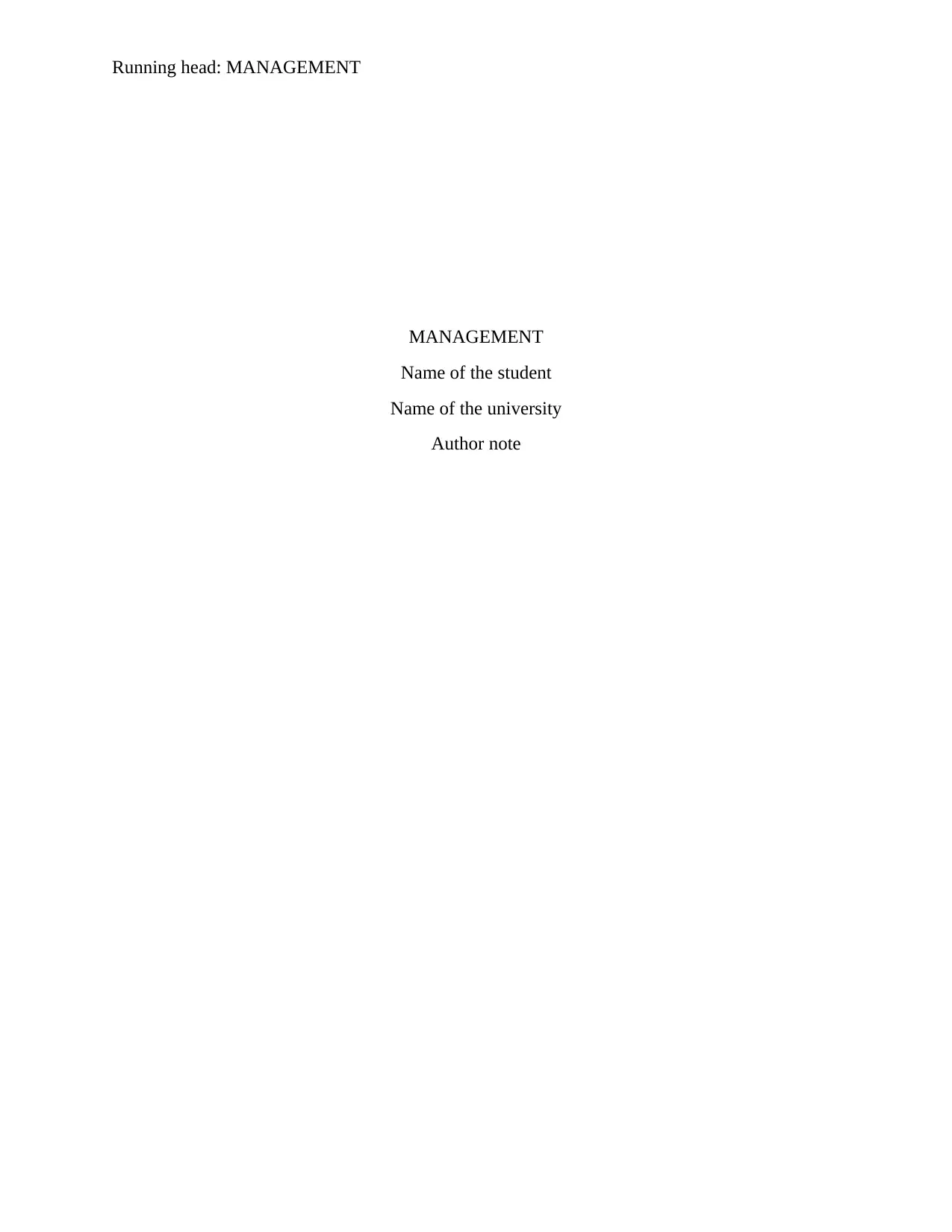
Running head: MANAGEMENT
MANAGEMENT
Name of the student
Name of the university
Author note
MANAGEMENT
Name of the student
Name of the university
Author note
Paraphrase This Document
Need a fresh take? Get an instant paraphrase of this document with our AI Paraphraser
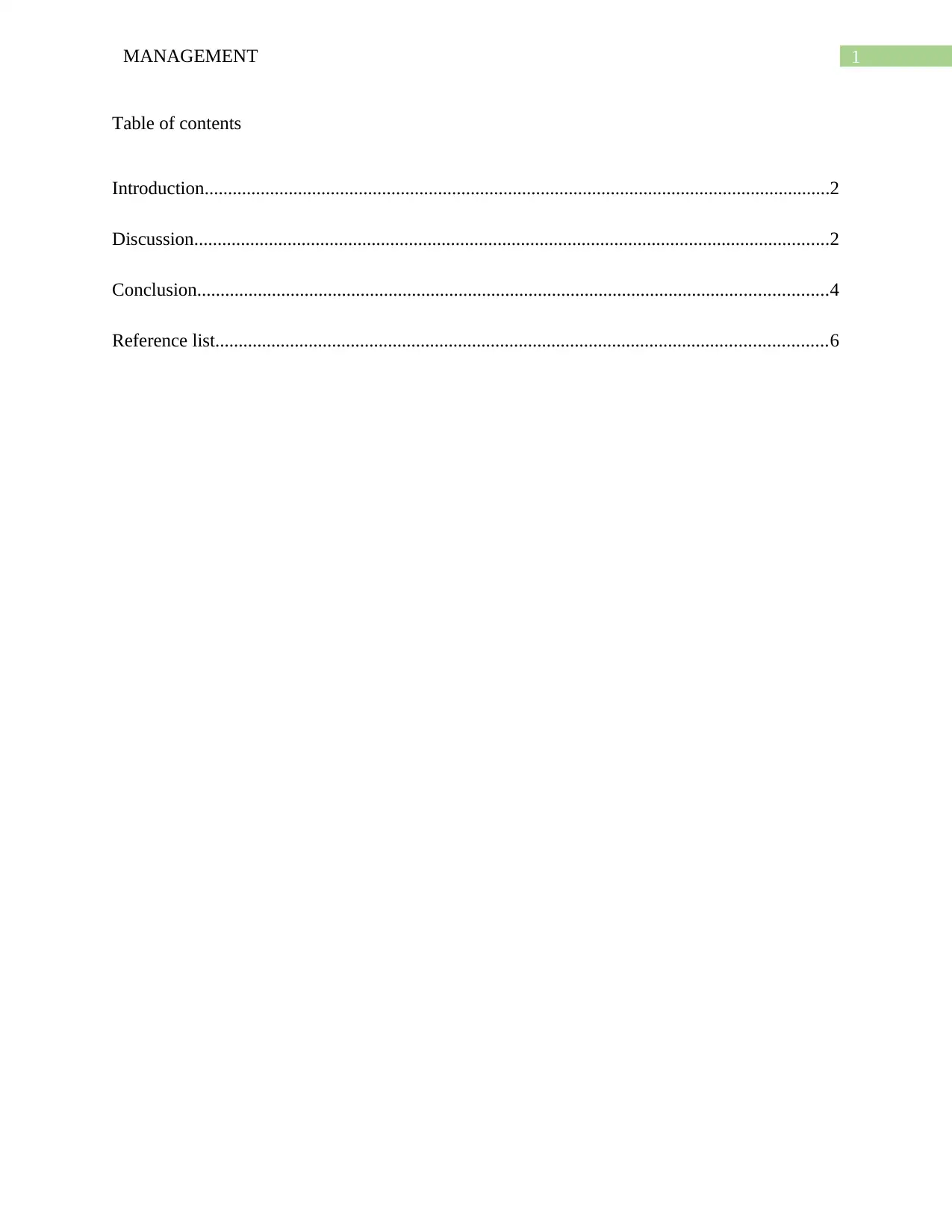
1MANAGEMENT
Table of contents
Introduction......................................................................................................................................2
Discussion........................................................................................................................................2
Conclusion.......................................................................................................................................4
Reference list...................................................................................................................................6
Table of contents
Introduction......................................................................................................................................2
Discussion........................................................................................................................................2
Conclusion.......................................................................................................................................4
Reference list...................................................................................................................................6
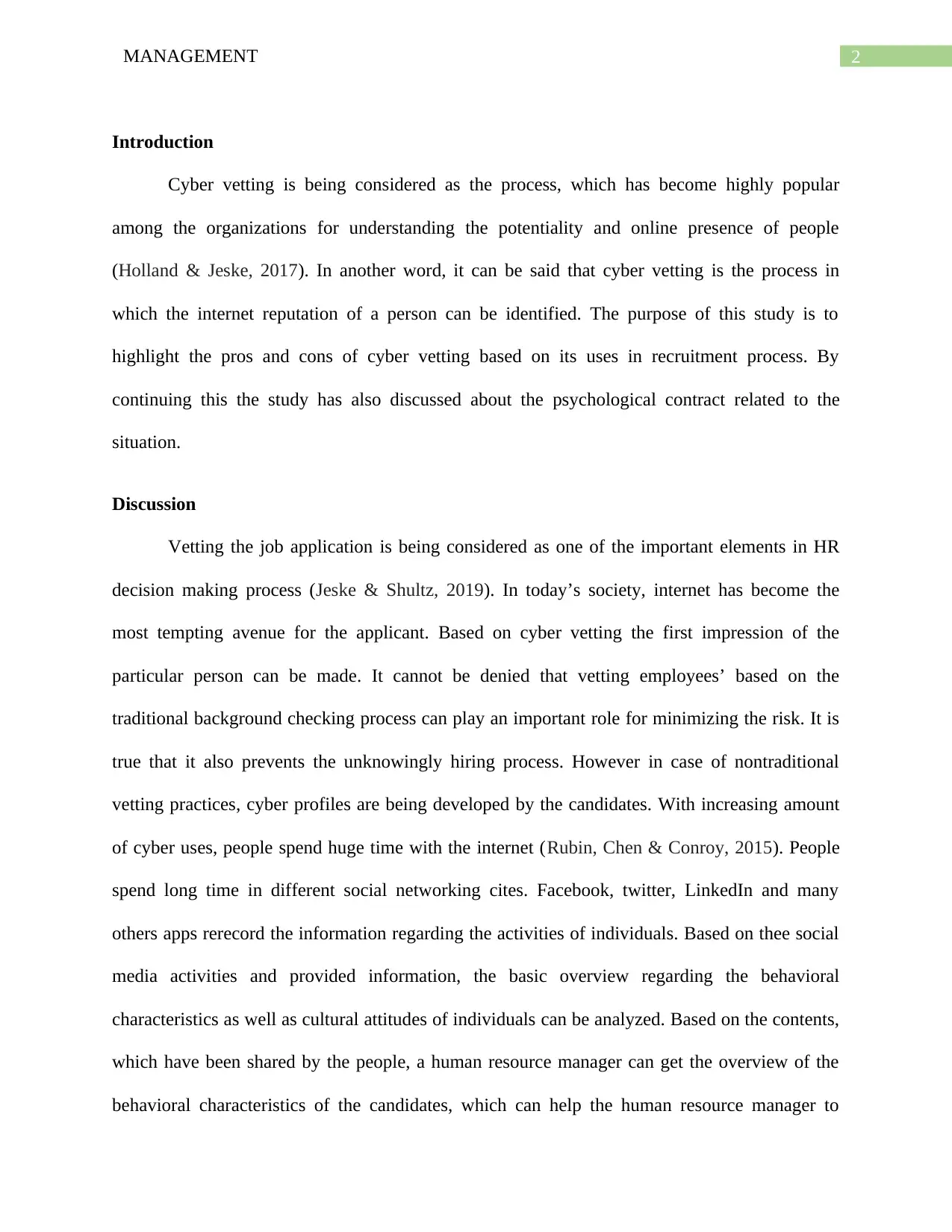
2MANAGEMENT
Introduction
Cyber vetting is being considered as the process, which has become highly popular
among the organizations for understanding the potentiality and online presence of people
(Holland & Jeske, 2017). In another word, it can be said that cyber vetting is the process in
which the internet reputation of a person can be identified. The purpose of this study is to
highlight the pros and cons of cyber vetting based on its uses in recruitment process. By
continuing this the study has also discussed about the psychological contract related to the
situation.
Discussion
Vetting the job application is being considered as one of the important elements in HR
decision making process (Jeske & Shultz, 2019). In today’s society, internet has become the
most tempting avenue for the applicant. Based on cyber vetting the first impression of the
particular person can be made. It cannot be denied that vetting employees’ based on the
traditional background checking process can play an important role for minimizing the risk. It is
true that it also prevents the unknowingly hiring process. However in case of nontraditional
vetting practices, cyber profiles are being developed by the candidates. With increasing amount
of cyber uses, people spend huge time with the internet (Rubin, Chen & Conroy, 2015). People
spend long time in different social networking cites. Facebook, twitter, LinkedIn and many
others apps rerecord the information regarding the activities of individuals. Based on thee social
media activities and provided information, the basic overview regarding the behavioral
characteristics as well as cultural attitudes of individuals can be analyzed. Based on the contents,
which have been shared by the people, a human resource manager can get the overview of the
behavioral characteristics of the candidates, which can help the human resource manager to
Introduction
Cyber vetting is being considered as the process, which has become highly popular
among the organizations for understanding the potentiality and online presence of people
(Holland & Jeske, 2017). In another word, it can be said that cyber vetting is the process in
which the internet reputation of a person can be identified. The purpose of this study is to
highlight the pros and cons of cyber vetting based on its uses in recruitment process. By
continuing this the study has also discussed about the psychological contract related to the
situation.
Discussion
Vetting the job application is being considered as one of the important elements in HR
decision making process (Jeske & Shultz, 2019). In today’s society, internet has become the
most tempting avenue for the applicant. Based on cyber vetting the first impression of the
particular person can be made. It cannot be denied that vetting employees’ based on the
traditional background checking process can play an important role for minimizing the risk. It is
true that it also prevents the unknowingly hiring process. However in case of nontraditional
vetting practices, cyber profiles are being developed by the candidates. With increasing amount
of cyber uses, people spend huge time with the internet (Rubin, Chen & Conroy, 2015). People
spend long time in different social networking cites. Facebook, twitter, LinkedIn and many
others apps rerecord the information regarding the activities of individuals. Based on thee social
media activities and provided information, the basic overview regarding the behavioral
characteristics as well as cultural attitudes of individuals can be analyzed. Based on the contents,
which have been shared by the people, a human resource manager can get the overview of the
behavioral characteristics of the candidates, which can help the human resource manager to
⊘ This is a preview!⊘
Do you want full access?
Subscribe today to unlock all pages.

Trusted by 1+ million students worldwide
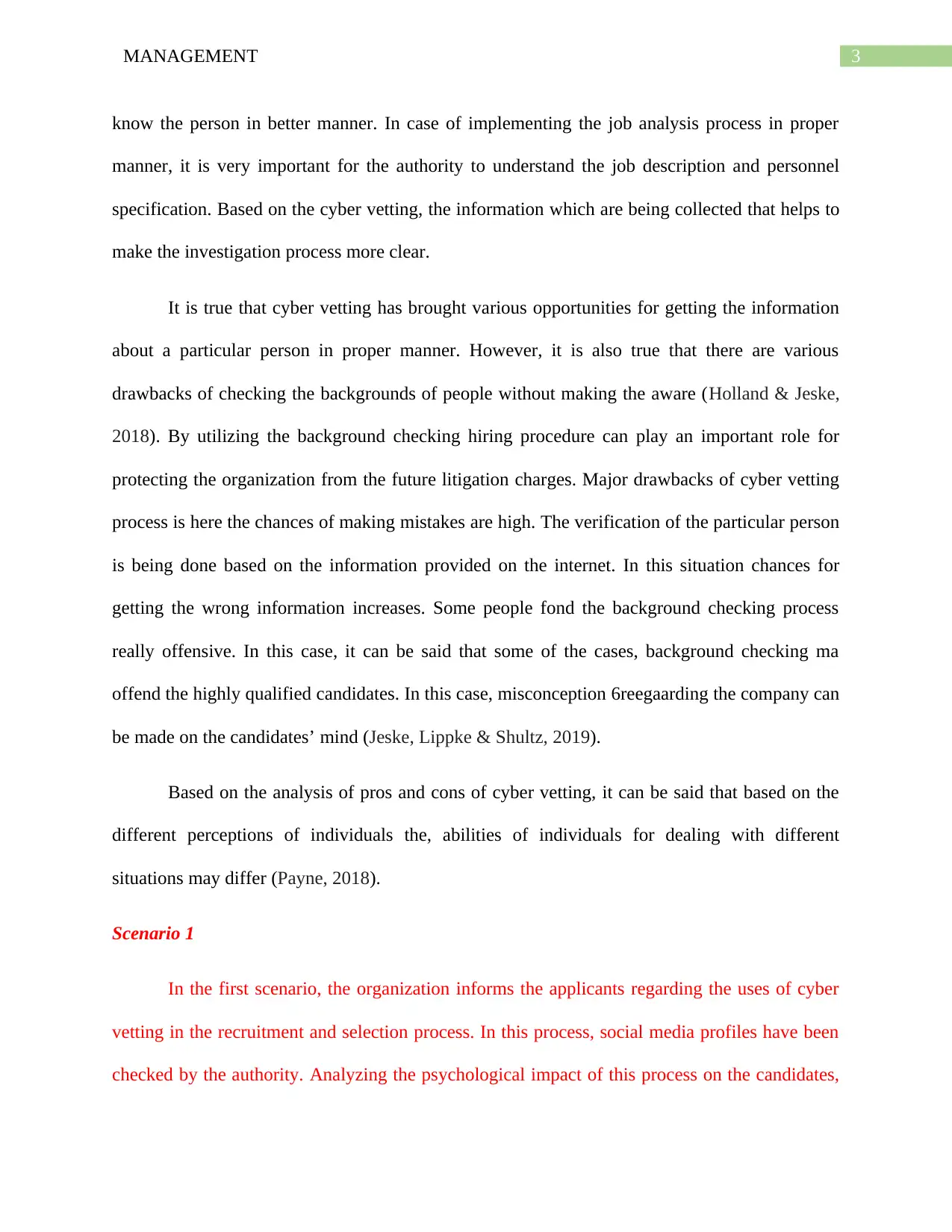
3MANAGEMENT
know the person in better manner. In case of implementing the job analysis process in proper
manner, it is very important for the authority to understand the job description and personnel
specification. Based on the cyber vetting, the information which are being collected that helps to
make the investigation process more clear.
It is true that cyber vetting has brought various opportunities for getting the information
about a particular person in proper manner. However, it is also true that there are various
drawbacks of checking the backgrounds of people without making the aware (Holland & Jeske,
2018). By utilizing the background checking hiring procedure can play an important role for
protecting the organization from the future litigation charges. Major drawbacks of cyber vetting
process is here the chances of making mistakes are high. The verification of the particular person
is being done based on the information provided on the internet. In this situation chances for
getting the wrong information increases. Some people fond the background checking process
really offensive. In this case, it can be said that some of the cases, background checking ma
offend the highly qualified candidates. In this case, misconception 6reegaarding the company can
be made on the candidates’ mind (Jeske, Lippke & Shultz, 2019).
Based on the analysis of pros and cons of cyber vetting, it can be said that based on the
different perceptions of individuals the, abilities of individuals for dealing with different
situations may differ (Payne, 2018).
Scenario 1
In the first scenario, the organization informs the applicants regarding the uses of cyber
vetting in the recruitment and selection process. In this process, social media profiles have been
checked by the authority. Analyzing the psychological impact of this process on the candidates,
know the person in better manner. In case of implementing the job analysis process in proper
manner, it is very important for the authority to understand the job description and personnel
specification. Based on the cyber vetting, the information which are being collected that helps to
make the investigation process more clear.
It is true that cyber vetting has brought various opportunities for getting the information
about a particular person in proper manner. However, it is also true that there are various
drawbacks of checking the backgrounds of people without making the aware (Holland & Jeske,
2018). By utilizing the background checking hiring procedure can play an important role for
protecting the organization from the future litigation charges. Major drawbacks of cyber vetting
process is here the chances of making mistakes are high. The verification of the particular person
is being done based on the information provided on the internet. In this situation chances for
getting the wrong information increases. Some people fond the background checking process
really offensive. In this case, it can be said that some of the cases, background checking ma
offend the highly qualified candidates. In this case, misconception 6reegaarding the company can
be made on the candidates’ mind (Jeske, Lippke & Shultz, 2019).
Based on the analysis of pros and cons of cyber vetting, it can be said that based on the
different perceptions of individuals the, abilities of individuals for dealing with different
situations may differ (Payne, 2018).
Scenario 1
In the first scenario, the organization informs the applicants regarding the uses of cyber
vetting in the recruitment and selection process. In this process, social media profiles have been
checked by the authority. Analyzing the psychological impact of this process on the candidates,
Paraphrase This Document
Need a fresh take? Get an instant paraphrase of this document with our AI Paraphraser
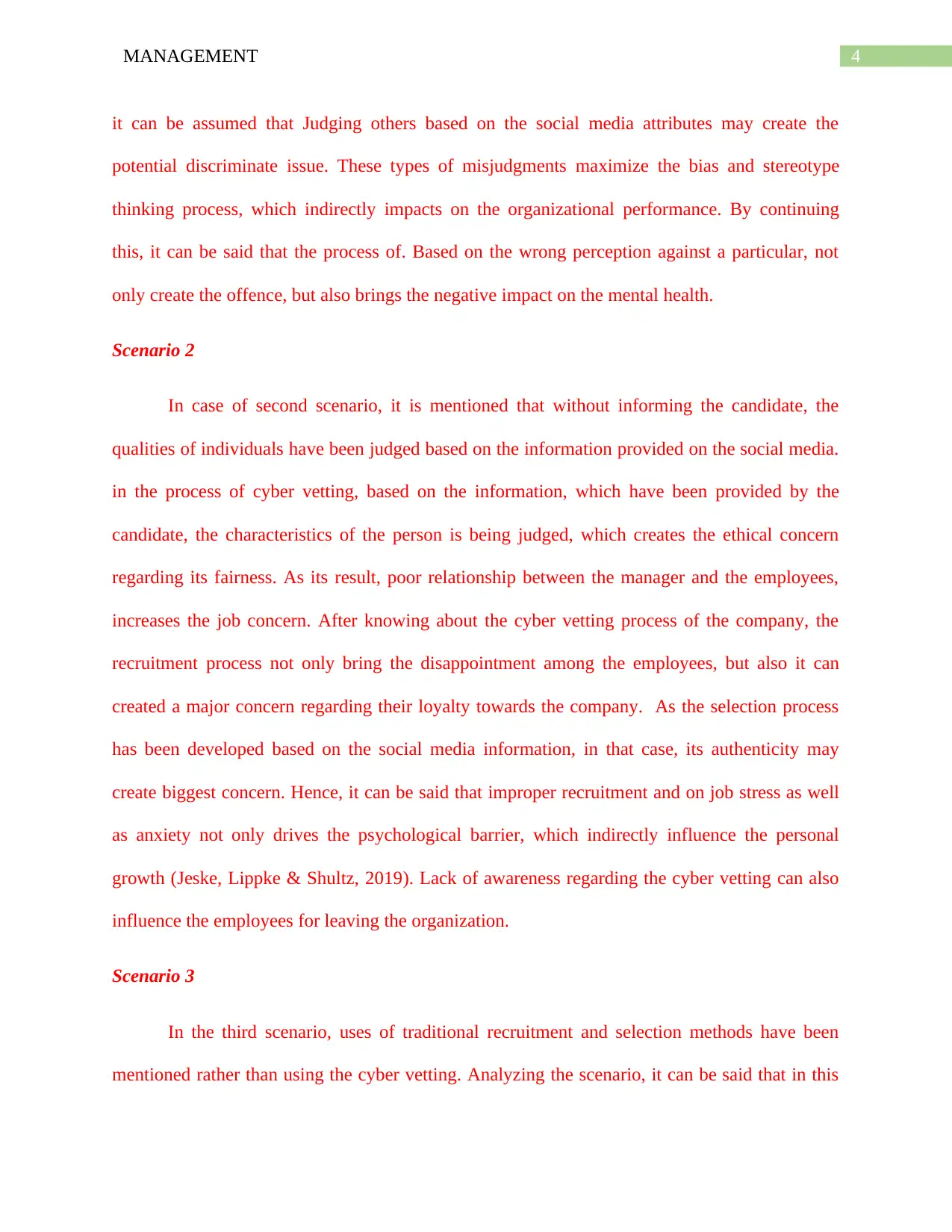
4MANAGEMENT
it can be assumed that Judging others based on the social media attributes may create the
potential discriminate issue. These types of misjudgments maximize the bias and stereotype
thinking process, which indirectly impacts on the organizational performance. By continuing
this, it can be said that the process of. Based on the wrong perception against a particular, not
only create the offence, but also brings the negative impact on the mental health.
Scenario 2
In case of second scenario, it is mentioned that without informing the candidate, the
qualities of individuals have been judged based on the information provided on the social media.
in the process of cyber vetting, based on the information, which have been provided by the
candidate, the characteristics of the person is being judged, which creates the ethical concern
regarding its fairness. As its result, poor relationship between the manager and the employees,
increases the job concern. After knowing about the cyber vetting process of the company, the
recruitment process not only bring the disappointment among the employees, but also it can
created a major concern regarding their loyalty towards the company. As the selection process
has been developed based on the social media information, in that case, its authenticity may
create biggest concern. Hence, it can be said that improper recruitment and on job stress as well
as anxiety not only drives the psychological barrier, which indirectly influence the personal
growth (Jeske, Lippke & Shultz, 2019). Lack of awareness regarding the cyber vetting can also
influence the employees for leaving the organization.
Scenario 3
In the third scenario, uses of traditional recruitment and selection methods have been
mentioned rather than using the cyber vetting. Analyzing the scenario, it can be said that in this
it can be assumed that Judging others based on the social media attributes may create the
potential discriminate issue. These types of misjudgments maximize the bias and stereotype
thinking process, which indirectly impacts on the organizational performance. By continuing
this, it can be said that the process of. Based on the wrong perception against a particular, not
only create the offence, but also brings the negative impact on the mental health.
Scenario 2
In case of second scenario, it is mentioned that without informing the candidate, the
qualities of individuals have been judged based on the information provided on the social media.
in the process of cyber vetting, based on the information, which have been provided by the
candidate, the characteristics of the person is being judged, which creates the ethical concern
regarding its fairness. As its result, poor relationship between the manager and the employees,
increases the job concern. After knowing about the cyber vetting process of the company, the
recruitment process not only bring the disappointment among the employees, but also it can
created a major concern regarding their loyalty towards the company. As the selection process
has been developed based on the social media information, in that case, its authenticity may
create biggest concern. Hence, it can be said that improper recruitment and on job stress as well
as anxiety not only drives the psychological barrier, which indirectly influence the personal
growth (Jeske, Lippke & Shultz, 2019). Lack of awareness regarding the cyber vetting can also
influence the employees for leaving the organization.
Scenario 3
In the third scenario, uses of traditional recruitment and selection methods have been
mentioned rather than using the cyber vetting. Analyzing the scenario, it can be said that in this
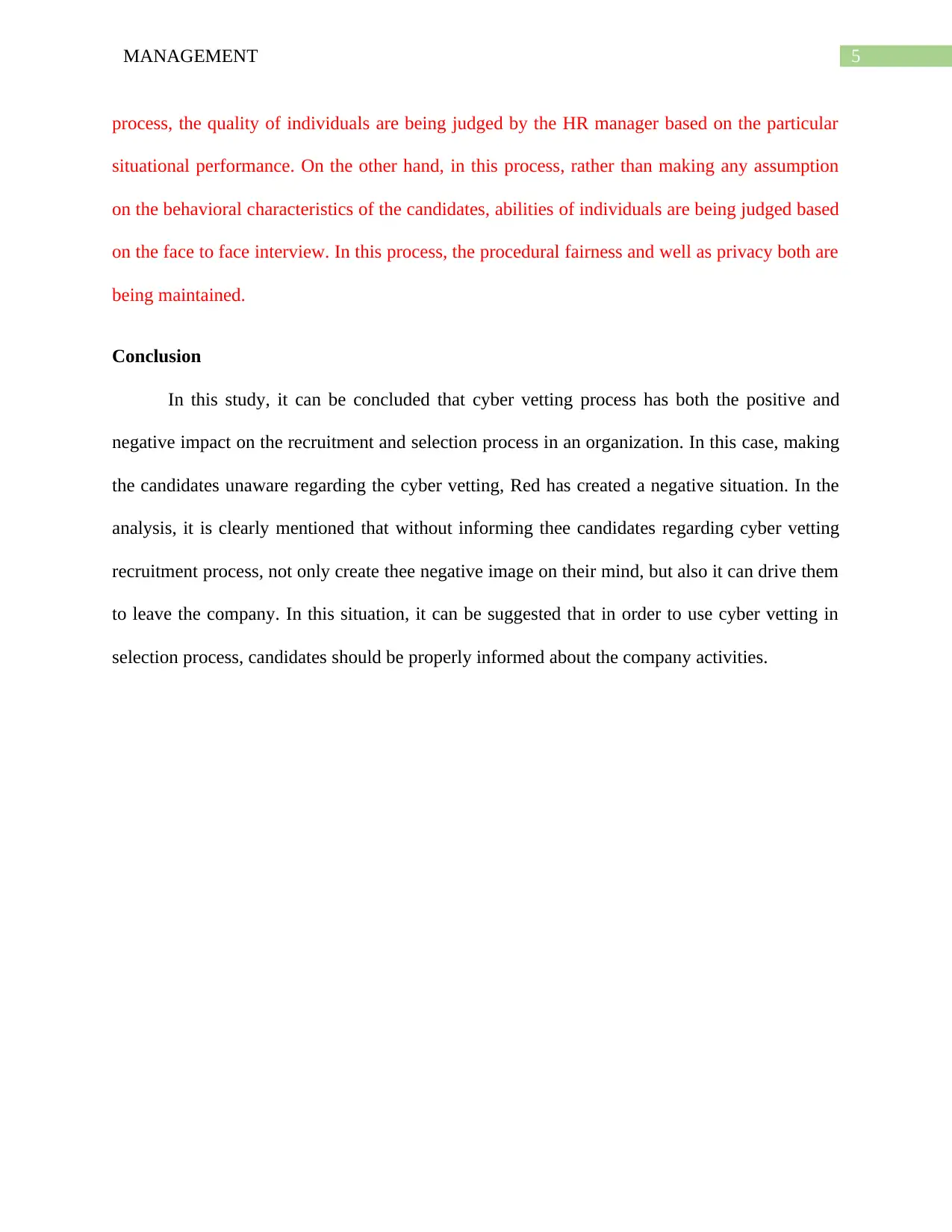
5MANAGEMENT
process, the quality of individuals are being judged by the HR manager based on the particular
situational performance. On the other hand, in this process, rather than making any assumption
on the behavioral characteristics of the candidates, abilities of individuals are being judged based
on the face to face interview. In this process, the procedural fairness and well as privacy both are
being maintained.
Conclusion
In this study, it can be concluded that cyber vetting process has both the positive and
negative impact on the recruitment and selection process in an organization. In this case, making
the candidates unaware regarding the cyber vetting, Red has created a negative situation. In the
analysis, it is clearly mentioned that without informing thee candidates regarding cyber vetting
recruitment process, not only create thee negative image on their mind, but also it can drive them
to leave the company. In this situation, it can be suggested that in order to use cyber vetting in
selection process, candidates should be properly informed about the company activities.
process, the quality of individuals are being judged by the HR manager based on the particular
situational performance. On the other hand, in this process, rather than making any assumption
on the behavioral characteristics of the candidates, abilities of individuals are being judged based
on the face to face interview. In this process, the procedural fairness and well as privacy both are
being maintained.
Conclusion
In this study, it can be concluded that cyber vetting process has both the positive and
negative impact on the recruitment and selection process in an organization. In this case, making
the candidates unaware regarding the cyber vetting, Red has created a negative situation. In the
analysis, it is clearly mentioned that without informing thee candidates regarding cyber vetting
recruitment process, not only create thee negative image on their mind, but also it can drive them
to leave the company. In this situation, it can be suggested that in order to use cyber vetting in
selection process, candidates should be properly informed about the company activities.
⊘ This is a preview!⊘
Do you want full access?
Subscribe today to unlock all pages.

Trusted by 1+ million students worldwide
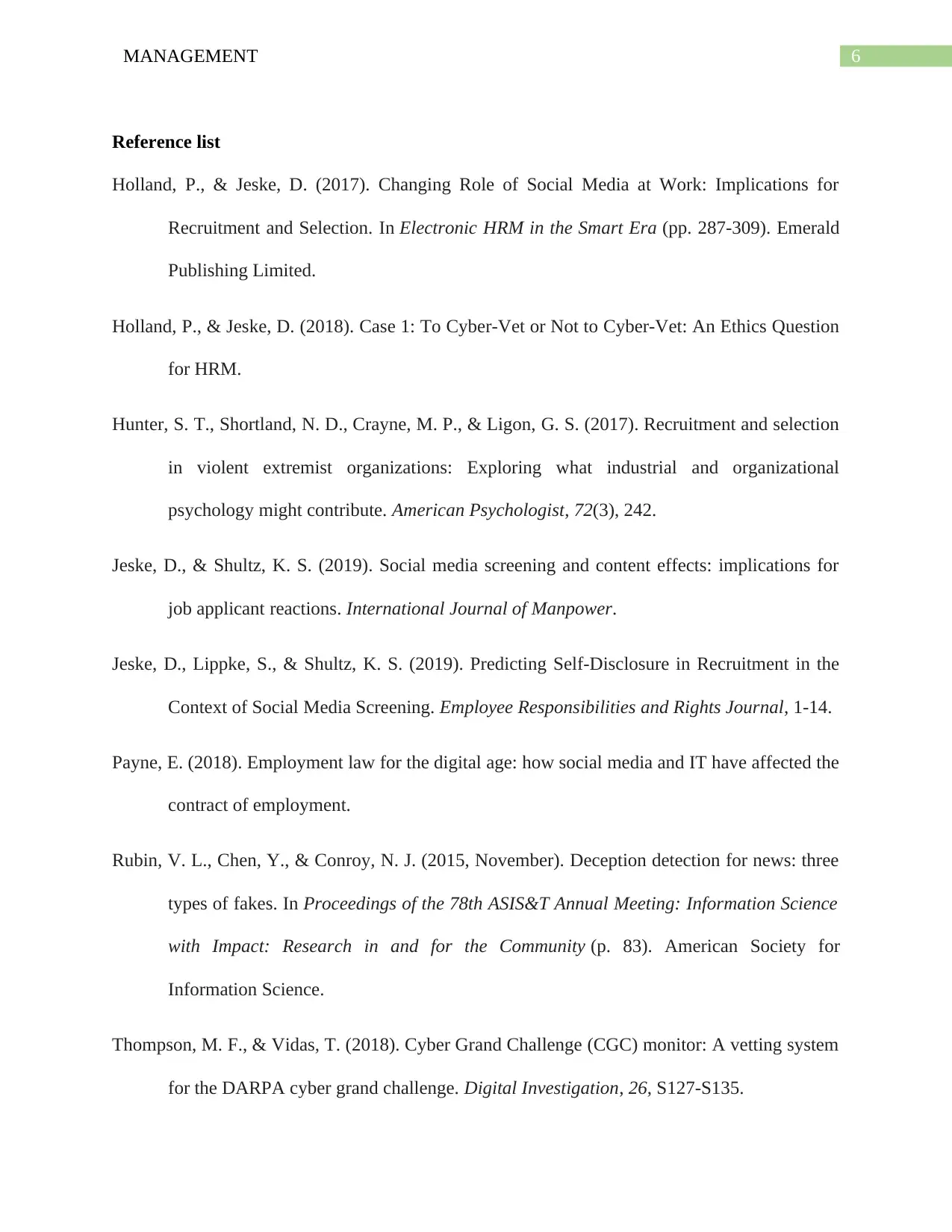
6MANAGEMENT
Reference list
Holland, P., & Jeske, D. (2017). Changing Role of Social Media at Work: Implications for
Recruitment and Selection. In Electronic HRM in the Smart Era (pp. 287-309). Emerald
Publishing Limited.
Holland, P., & Jeske, D. (2018). Case 1: To Cyber-Vet or Not to Cyber-Vet: An Ethics Question
for HRM.
Hunter, S. T., Shortland, N. D., Crayne, M. P., & Ligon, G. S. (2017). Recruitment and selection
in violent extremist organizations: Exploring what industrial and organizational
psychology might contribute. American Psychologist, 72(3), 242.
Jeske, D., & Shultz, K. S. (2019). Social media screening and content effects: implications for
job applicant reactions. International Journal of Manpower.
Jeske, D., Lippke, S., & Shultz, K. S. (2019). Predicting Self-Disclosure in Recruitment in the
Context of Social Media Screening. Employee Responsibilities and Rights Journal, 1-14.
Payne, E. (2018). Employment law for the digital age: how social media and IT have affected the
contract of employment.
Rubin, V. L., Chen, Y., & Conroy, N. J. (2015, November). Deception detection for news: three
types of fakes. In Proceedings of the 78th ASIS&T Annual Meeting: Information Science
with Impact: Research in and for the Community (p. 83). American Society for
Information Science.
Thompson, M. F., & Vidas, T. (2018). Cyber Grand Challenge (CGC) monitor: A vetting system
for the DARPA cyber grand challenge. Digital Investigation, 26, S127-S135.
Reference list
Holland, P., & Jeske, D. (2017). Changing Role of Social Media at Work: Implications for
Recruitment and Selection. In Electronic HRM in the Smart Era (pp. 287-309). Emerald
Publishing Limited.
Holland, P., & Jeske, D. (2018). Case 1: To Cyber-Vet or Not to Cyber-Vet: An Ethics Question
for HRM.
Hunter, S. T., Shortland, N. D., Crayne, M. P., & Ligon, G. S. (2017). Recruitment and selection
in violent extremist organizations: Exploring what industrial and organizational
psychology might contribute. American Psychologist, 72(3), 242.
Jeske, D., & Shultz, K. S. (2019). Social media screening and content effects: implications for
job applicant reactions. International Journal of Manpower.
Jeske, D., Lippke, S., & Shultz, K. S. (2019). Predicting Self-Disclosure in Recruitment in the
Context of Social Media Screening. Employee Responsibilities and Rights Journal, 1-14.
Payne, E. (2018). Employment law for the digital age: how social media and IT have affected the
contract of employment.
Rubin, V. L., Chen, Y., & Conroy, N. J. (2015, November). Deception detection for news: three
types of fakes. In Proceedings of the 78th ASIS&T Annual Meeting: Information Science
with Impact: Research in and for the Community (p. 83). American Society for
Information Science.
Thompson, M. F., & Vidas, T. (2018). Cyber Grand Challenge (CGC) monitor: A vetting system
for the DARPA cyber grand challenge. Digital Investigation, 26, S127-S135.
1 out of 7
Related Documents
Your All-in-One AI-Powered Toolkit for Academic Success.
+13062052269
info@desklib.com
Available 24*7 on WhatsApp / Email
![[object Object]](/_next/static/media/star-bottom.7253800d.svg)
Unlock your academic potential
Copyright © 2020–2026 A2Z Services. All Rights Reserved. Developed and managed by ZUCOL.



